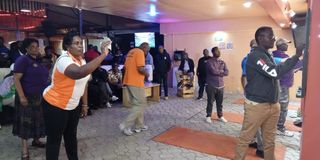Gender bias tarnishes Nakuru sports: Women earn less prize money than men

Milicent Wanjohi, throwing a dart during the singles category final match at the Nakuru Darts Open Cup on August 6, 2023.
When discussing gender inequality in sports, the gender pay gap remains a central issue. Across many disciplines, female athletes earn significantly less than their male counterparts—despite putting in the same level of effort, training, and commitment.
This disparity has forced many women in sports to juggle full-time jobs alongside their athletic careers just to make ends meet.
A spot check by Mtaa Wangu uncovered glaring discrepancies in prize money awarded to men and women in several tournaments held in Nakuru.
For instance, during the Rangers Gaming Tournament, the men's category had a prize pool of Sh. 150,000, while the women's category received just Sh. 30,000. At the Pool Fiesta hosted at Space Next Door, men competed for Sh. 238,000, while women vied for Sh. 60,000.
In the November 2024 darts tournament at Jacaranda, men played for Sh. 55,000, compared to Sh. 28,000 for women.
Millicent Wangui, a darts player with five years of experience, recalls encountering this gap when she first joined the sport.
"The difference in pay is something we've always raised as female players because we play the same game and pay the same registration fees," she explains.
Tournament organizers often justify the gap by pointing to the lower number of women participants. But Wangui argues that equal pay is crucial not only for empowerment but also for inspiring the next generation of female athletes.
"Many women drop out due to low morale, as the earnings aren’t sustainable. Others simply shift to better-paying jobs," she says.
Although efforts to address the pay gap have led to slight improvements where professional female players can now earn up to Sh. 30,000, Wangui believes more progress is needed.
"These are small steps, but I’m hopeful. One day, women will believe they can fully rely on their talent and be paid fairly."
Chol Riak, captain of Chilli's Pool Table Team, acknowledges the long-standing disparity but says the gap is slowly narrowing.
"In the past, many women were hesitant to join pool tournaments due to societal perceptions, but that’s changing," he says.
He adds that while prize money for women remains low, it’s gradually improving as female participation increases.
Currently, registration fees for women are lower than those for men—another factor organizers use to justify unequal pay.
However, he suggests that if registration fees were standardized, equal prize money would be more justified.
Kevin Karuga a gender expert points out that economic arguments are frequently used to rationalize the disparity.

Kevin Karuga is a gender expert working in Nakuru.
"People often claim that women’s sports generate less revenue, and therefore female athletes should be paid less," he says.
But Karuga challenges this logic, noting that most decision-makers are men and societal norms reinforce these inequalities.
"For gender-equal pay to truly work, we need to dismantle patriarchy and adopt merit-based systems. The lack of female representation in leadership only perpetuates this cycle."
Still, he remains optimistic. With growing awareness and a collective push for equitable practices, through gender mainstreaming Karuga believes sports can evolve into a space where all athletes—regardless of gender—are fairly compensated for their contributions.
